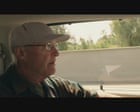The subject of HBO’s critically acclaimed showThe Morticianadmits on screen that there are “three [things] altogether” which “can’t come back” and that he can’t talk about publicly – after the docuseries mentions deaths for which he was suspected of being responsible, among them one at the center of a failed attempt to prosecute him on charges that he murdered a rival mortuary owner.
David Sconce’s haunting statements on the show’s third and final episode late on Sunday are “clearly implying some very serious crimes have been committed”, The Mortician’s director, Joshua Rofé, told the Guardian. But it wasn’t immediately clear what, if any, consequences there may be.
“If there is a [prosecutor] out there who deems it fit, who thinks there is enough to even go by, then great,” Rofé said. “They should do it.”
The sequence is bound to draw comparisons to the conclusion of the 2015 season of the HBO documentary The Jinx, in which the late Robert Durst is overheard confessing that he “killed them all” – an evident reference to three people he was thought to have murdered in prior years.
That admission from Durst, who died in January 2022, was costly. In September 2021, he was found guilty of murdering a friend who helped him cover up the killing of his first wife.
Sconce – whose family’s Lamb funeral home in Pasadena,California, became synonymous with illegal mass cremations and achieved national notoriety in the 1980s – delivers the comments in question shortly before an acquaintance of his is asked how many murders he thinks the series’s subject may have had a hand in. The acquaintance, who is granted anonymity, replies: “I figure three.”
Rofé’s film largely revisits funeral industry reforms spurred by a tortuous criminal case brought against Sconce and the Lamb mortuary involving charges of mass cremations at a ceramics kiln; stealing and selling corpses’ gold jewelry and dental fillings; stealing and selling corpses’ organs; delivering fake ashes to people mourning dead loved ones; and plotting violence against competitors.
One of those competitors was the Burbank, California, mortician Timothy Waters, who prosecutors maintained had died in 1985 after ingesting oleander that Sconce furtively used to poison a meal that the two men shared.
Investigators later used a special tool to analyze Waters’ liver and kidney tissue for derivatives of oleander. None were found, and, in 1991, the charges that Sconce had murdered Waters weredismissed.
“No oleander – nothing, zero, zippo,” Sconce’s attorney, Roger Diamond, says of Waters’ death in archival footage shown in The Mortician. “The man died of a heart attack.”
Sconce, meanwhile, says in archival footage: “I always knew I’d walk out. I’m innocent.” He had been facing the possibility of execution.
Yet, in stunning commentary on The Mortician, Cornell University toxicology professor Jack Henion – who served as a court expert on the Waters murder case – says the absence of an oleander derivative in the studied tissue does not mean it “was never present”.
Such a substance “is unstable and may have broken down to undetectable levels over the past five years”, Henion says on The Mortician.
Henion adds that in his unofficial opinion Sconce “likely” was guilty of killing Waters but “got away with it”. One piece of circumstantial evidence which Henion cites is Sconce’s possession of a book that details how difficult it is to detect oleander poisoning, along with an accompanying illustration of someone dining with a knife and a fork.
What Sconce ultimately did plead guilty to included mutilating bodies, conducting mass cremations at just $55 a body and various other crimes. That led to a series of incarcerations – the most recent of which he was paroled from in 2023 – as well as lifetime probation.
Walters isn’t the only death in Sconce’s orbit that thrust him under suspicion, as The Mortician notes.
The docuseries also recounts how an employee of Sconce named Ron Jordan was found hanged and dead after indicating that he wanted to quit his job while promising he would keep quiet about all the illicit things he had seen. Investigators deemed Jordan’s death a suicide, though in the series Sconce acknowledges that some surmised he was responsible – to which he says: “Why would I want to kill him? Seriously?”
Additionally, as The Mortician winds down, Sconce shares an anecdote about a man who robbed him at gunpoint in front of his now ex-wife during a trip to the cemetery. “All I can say is – do you think I found that guy [later]?” Sconce asks Rofé. “It’s one of the things I can’t talk about. The other thing I’ll tell you about, too, but you can’t talk about that either.”
Sconce continues: “Really, there’s three of them altogether … OK – promise not to tell on me.”
Rofé then tells him he is not interested in having any information that he would not be allowed to air, prompting Sconce to retort: “Ah, it’s never going to come back. It’s never going to come back – can’t come back.”
Following that exchange is an excerpt from an interview Rofé said he filmed about two months later. The excerpt depicts the anonymous Sconce acquaintance discussing his belief that The Mortician’s subject was a part of three murders.
Whatever the case, with respect to the conclusion Sconce gave him, Rofé remarked: “I could not believe what he said.”
The director added: “In one moment, when his guard drops, he shows you exactly who he really is. And I think that if you are to walk away with a feeling about what you want to happen, you would like justice or a fair shake for anybody who was a victim of a person who, in that moment, revealed who they really are.”
